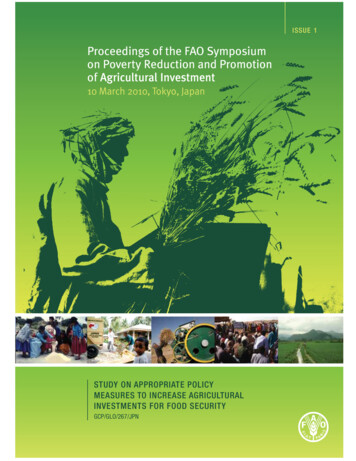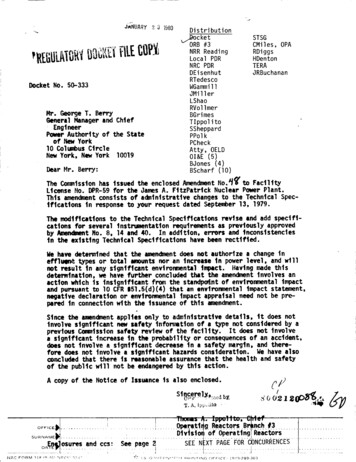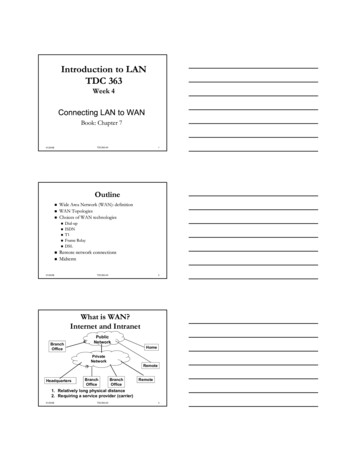
Transcription
ISSUE 11SPDFFEJOHT PG UIF '"0 4ZNQPTJVN PO 1PWFSUZ 3FEVDUJPO BOE 1SPNPUJPO PG "HSJDVMUVSBM *OWFTUNFOU .BSDI 5PLZP BQBOSTUDY ON APPROPRIATE POLICYMEASURES TO INCREASE AGRICULTURALINVESTMENTS FOR FOOD SECURITYGCP/GLO/267/JPN
1SPDFFEJOHT PG UIF '"0 4ZNQPTJVN PO 1PWFSUZ 3FEVDUJPO BOE 1SPNPUJPO PG "HSJDVMUVSBM *OWFTUNFOU 10 March 2010, Tokyo, JapanFood and Agriculture Organization of the United NationsRome 2010
** 1SPDFFEJOHT PG UIF '"0 4ZNQPTJVN PO 1PWFSUZ 3FEVDUJPO BOE 1SPNPUJPO PG "HSJDVMUVSBM *OWFTUNFOU
1SPDFFEJOHT PG UIF '"0 4ZNQPTJVN PO 1PWFSUZ 3FEVDUJPO BOE 1SPNPUJPO PG "HSJDVMUVSBM *OWFTUNFOU ***5BCMF PG POUFOUTPreface*7Acknowledgements7Summary Report1. Opening2. Keynote Speech3. Panel Discussion3.1 Session One: Private Sector Approach to Poverty Reduction3.2 Session Two: for the Promotion of InternationalAgricultural Investments4. ClosingAppendixesAppendix 1: Symposium ProgrammeAppendix 2: Opening RemarkAppendix 3: Keynote SpeechAppendix 4: Issue Paper For Session OneAppendix 5: Issue Paper For Session Two (1)Appendix 6: Issue Paper For Session Two (2)Appendix 7: Presentations By PanelistsAppendix 8: Japanese Trust Fund Project (GCP/GLO/267/JPN)
*7 1SPDFFEJOHT PG UIF '"0 4ZNQPTJVN PO 1PWFSUZ 3FEVDUJPO BOE 1SPNPUJPO PG "HSJDVMUVSBM *OWFTUNFOU 1SFGBDFThe Food and Agriculture Organization of the United Nations (FAO), with additional financialsupport from the Ministry of Agriculture, Forestry and Fisheries of Japan (MAFF), has initiated theproject, “Support to study [on] appropriate policy measures to increase investments in agricultureand to stimulate food production” (GCP/GLO/267/JPN). The aim of the project is to identify a policyframework for promoting, facilitating and supporting acceleration of investment by the public andprivate sectors to achieve domestic capital formation for stimulating sustainable food production. Asone of the project’s activities, FAO, in collaboration with MAFF, organized a Symposium on PovertyReduction and Promotion of Agricultural Investment, in Tokyo on 10 March 2010.The purpose of the Symposium was to engage the stakeholders, including the private sector, publicsector and NGOs, in discussions about their contribution and roles in promoting investment and tofind practical ways to mobilize investment in agriculture for increasing food production and reducingthe number of undernourished populations in the world. Approximately 230 participants attendedthe Symposium. Speakers and panelists included senior policy makers from selected countries;experts from agribusiness and agro-industries and NGOs; representatives from MAFF; the Ministry ofForeign Affairs of Japan; FAO, the United Nations Conference on Trade and Development (UNCTAD);the World Bank and the African Union’s New Partnership for Africa’s Development Secretariat. DrSupachai Panitchpakdi, Secretary-General, UNCTAD, was the keynote speaker for the Symposium.The discussion focused on two themes: Private Sector Approach to Poverty Reduction; and Promotionof International Agricultural Investments. It highlighted the importance of enhancing agriculturalinvestments to increase production and suggested various pragmatic approaches to induce differentsectors and stakeholders to invest in agriculture. It also provided suggestions for the future directionof the project.These Proceedings comprise the summary report, papers presented, presentations shown at theSymposium and other related materials.
1SPDFFEJOHT PG UIF '"0 4ZNQPTJVN PO 1PWFSUZ 3FEVDUJPO BOE 1SPNPUJPO PG "HSJDVMUVSBM *OWFTUNFOU 7"DLOPXMFEHFNFOUTWe are pleased to acknowledge all the speakers, moderators and panelists of the Symposium fortheir involvement and contribution. The Symposium would not have been successful without theirwillingness to participate and invaluable contributions. We are particularly thankful to Dr SupachaiPanitchpakdi, Secretary General, UNCTAD, for giving the key note speech, sharing his valuableexperience and his inputs to the discussion. We would also like to thank all the public attendees fortheir participation and contribution to the discussions. Their interest in the issues discussed at theSymposium made it a worthwhile exercise.We express our gratitude to the Ministry of Agriculture, Forestry and Fisheries of Japan, whichco-organized the Symposium, for its assistance in developing the programme and organizingthe Symposium.The support of the FAO Liaison Office in Japan for arranging the venue, organizing the travel andaccommodation for the participants and publicizing this event is gratefully acknowledged.We are also grateful to Ms Sylvaine Thomas, Ms Elisabetta Robinson and Ms Ana Maria Galvan of FAO,for handling all the administrative and logistical arrangements during the lead-up to the Symposiumand for helping with the publication process.
7* 1SPDFFEJOHT PG UIF '"0 4ZNQPTJVN PO 1PWFSUZ 3FEVDUJPO BOE 1SPNPUJPO PG "HSJDVMUVSBM *OWFTUNFOU
1SPDFFEJOHT PG UIF '"0 4ZNQPTJVN PO 1PWFSUZ 3FEVDUJPO BOE 1SPNPUJPO PG "HSJDVMUVSBM *OWFTUNFOU 4VNNBSZ 3FQPSU 1. OPENINGMr Richard China, Director, Policy and Programme Development Support Division, Food andAgriculture Organization of the United Nations (FAO), opened the Symposium on behalf of FAO.He welcomed the invited speakers and panelists as well as the public audience and thanked thespeakers and panelists for accepting the invitation to participate. He expressed special thanks to MrSupachai Panitchpakdi, Secretary-General, United Nations Conference on Trade and Development(UNCTAD), for accepting the invitation to be the keynote speaker. He conveyed to the Ministry ofAgriculture Forestry and Fisheries of Japan (MAFF) FAO’s appreciation for the approval of the ProjectGCP/GLO/267/JPN and facilitation of the organization of the Symposium which he emphasizedwould contribute to increasing agricultural investment, enhancing food production and reducingfood insecurity and poverty. He stressed the need to promote proper investment in agriculture andstrengthen involvement of all stakeholders including the private sector and non-governmentalorganizations (NGOs).Mr Akira Gunji, Senior Vice-Minister of Agriculture, Forestry and Fisheries, Japan, delivered welcomeremarks on behalf of MAFF (Appendix 2). He stressed that it was vital for various types of agriculturematching different local farming conditions to co-exist as well as for each country to enhance itsagriculture production capacity with a view to enhancing global food security. He further stated that,in order to increase agricultural investment and reduce poverty, it was necessary to facilitate dialogueinvolving all stakeholders to discuss their respective roles and that MAFF would continue to activelyengage in such dialogue.2. KEYNOTE SPEECHMr Supachai Panitchpakdi, Secretary-General, UNCTAD, gave a keynote speech (Appendix 3). In hisspeech, he emphasized that given the ongoing food security crisis and the urgent need for increasedinvestment in agriculture in developing countries, the involvement of transnational corporations(TNCs) was inevitable and the real question for most developing countries was not whether to involveTNCs in agriculture and agribusiness value chains, but how to establish a framework and developnational capabilities to best harness their involvement so that the host country benefits. He furtherhighlighted that TNCs could potentially offer a valuable source of external finance as well as accessto technology and expertise that contributed not only to food security but also to the creation ofproductive capacities and economic development in general.3. PANEL DISCUSSIONThere were two themes for discussion at this symposium. The first was how to promote engagementof non-public sectors such as the private sector and NGOs with poverty reduction (Session One). Thesecond was how to promote desirable international investment in agriculture (Session Two).1This summary report is prepared under the responsibility of the Policy and Programme Development Support Division,FAO. It does not necessarily cover all points made during the Symposium, nor it is endorsed by its participants.
1SPDFFEJOHT PG UIF '"0 4ZNQPTJVN PO 1PWFSUZ 3FEVDUJPO BOE 1SPNPUJPO PG "HSJDVMUVSBM *OWFTUNFOU 3.1 Session One: Private Sector Approach to Poverty Reduction(Moderator: Mr Masaru Iwanaga, Director General, National Institute of Crop Science)Mr Keith Wiebe, Deputy Director, Agricultural Development Economics Division, FAO, presentedan issue paper (Appendix 4). He provided an overview of world poverty in which the number ofundernourished populations recently increased dramatically to more than one billion and statedthat agriculture was the key to poverty reduction. Regarding this, he noted that opportunities werenot equal, which made it necessary to invest more in agriculture in developing countries so thatmany vulnerable small scale farmers could respond to market conditions and meet future demand.Furthermore, he emphasized that stronger collaboration between governments and the civil societywould be essential for that purpose.Subsequently, panelists provided comments on the first discussion point:UÊÊ7 ÌÊ ÃÊÌ iÊ« Ìi Ì Ê vÊ« ÛiÀÌÞÊÀi ÕVÌ Ê VÌ Û Ì iÃÊLÞÊÌ iÊ«À Û ÌiÊÃiVÌ À¶ÀÊ,Þ V Ê1 } Ü ]ÊExecutive Managing Director, Tree of Life Co. Ltd., presented the company’sschemes assisting farmers in producing shea butter in Ghana, coffee in Ethiopia and honey in Kenya.He emphasized that the key to success was to pursue value addition to products for business purposes,as well as for poverty reduction purposes.Ms Michiko Ando, Table for Two International, presented their scheme of collecting a proportion ofthe meal fees in cafeterias at private companies, public organizations and others and donating it todeveloping countries. She mentioned that, responding to growing consumer demand for productscontributing to social responsibility, private companies are expected to increase their engagement inpoverty reduction activities as part of their marketing strategy.ÀÊ ÃivÊ-V ÕLiÀ]ÊHead, Global Perspective Studies Unit, FAO, commented on the importanceof the Public Private Partnership (PPP) in order for developing countries to benefit from moderntechnologies and increase agricultural productivity. He stated that the public sector needs tounderstand liability, create a focal point for communication, understand IP issues and prepare exitstrategies to proceed with PPP.The panelists answered questions from the public audience.Responding to a question regarding a long-term perspective on food demand and agriculturalproduction, Mr Wiebe replied that in order to forecast a long term trend, they needed to reflectvarious factors such as foreseeable population increase in developing countries, consequent increasein food consumption and changes in agricultural structure.To a question about factors outside agriculture that impact on food prices, Mr Wiebe responded thatenergy prices have close links with food prices and in this connection biofuel production is also saidto have an influence. Other factors such as change in demand in developing countries, exchange ratefluctuations and export restrictions also have an impact on food prices.To a question concerning the grassroots level assistance, including assistance from Japanese farmers toAfrican farmers, ÀÊ1 } Ü responded that those who are capable of carrying out necessary tasksor providing supplies or equipment which match the level of recipients’ needs should do so. Ms Andoreplied that there were already activities at the grassroots level; for example, funding was provided tocreate farming gardens in schools in Africa and local farmers were invited to provide teaching on thecultivation of crops in school gardens.Next, panelists provided comments on the second discussion point:UÊÊ ÜÊV ÊV «iÀ Ì Ê }ÊÌ iÊ«ÕL VÊÃiVÌ À]ÊÌ iÊ«À Û ÌiÊÃiVÌ ÀÊ Ê "ÃÊLiÊv V Ì Ìi ¶ÊÀÊ ÀÌ Ê Ü Þ ]ÊSenior Specialist, Sustainable Land and Water Management, New Partnershipfor Africa’s Development (NEPAD) secretariat of the African Union, commented that issues on foodand nutrition are development issues and central to Africa; it is important to harness quality privateinvestment in African agriculture. Public-Private-NGOs’ collaboration is a must for wealth creation,poverty reduction and growth in Africa and it is necessary to combine the strengths of each sector inorder to create greater economic value than when they are acting individually.
1SPDFFEJOHT PG UIF '"0 4ZNQPTJVN PO 1PWFSUZ 3FEVDUJPO BOE 1SPNPUJPO PG "HSJDVMUVSBM *OWFTUNFOU ÀÊ iÃ Ê À ]ÊResearch Director, South Asia Watch on Trade, Economics and Environment(SAWTEE), reported on his experience of working on plant breeding and seed systems in Nepal,Bangladesh and India and stated that, in order to enhance the Public-Private-NGOs collaboration,each sector needs to understand the social and economic interests of the other sectors. He alsosaid that such cooperation would be facilitated through collaborative research and development,addressing IP related issues and market development. He further emphasized the necessity ofestablishing a code of conduct to facilitate the partnership and policy reform for greater involvementof local people.Mr Wiebe commented that it is important that the public sector fulfils its basic functions includingensuring security of property: such as intellectual property rights and natural resources, and buildingcapacity. He also noted that the interests of different segments should be represented.Following their presentations, the panelists answered questions from the public audience.Responding to a question on budget allocation of African countries to the agriculture sector and itscomparison to military budget, ÀÊ Ü Þ answered that in 2003, the heads of the African Unionmember countries committed themselves to allocating at least 10% of national budgetary resource
1SPDFFEJOHT PG UIF '"0 4ZNQPTJVN PO 1PWFSUZ 3FEVDUJPO BOE 1SPNPUJPO PG "HSJDVMUVSBM *OWFTUNFOU 4VNNBSZ 3FQPSU 1. OPENING Mr Richard China, Director, Policy and Programme Development Support Division, Food and Agriculture Organization of the United Nations (FAO), opened the Symposium on behalf of FAO.











